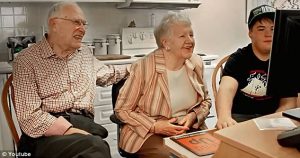Katie Young is a planning manager for the Philadelphia corp for Ageing (PCA), and has a Master’s degree in gerontology (the science of ageing). Always on the lookout for ageism she says that when people say she looks young for her age she bristles. “That is my age” she says, “therefore I look exactly my age.”
‘You look great for your age,’ is another backhanded compliment. Along with “you have a lot of energy… for your age.”

What these comments and others like them reveal is that today’s evaluator is youthfulness. Not kindness or generosity or strength or wisdom – just youthfulness. We’ve absorbed it so unconsciously that we simply don’t see it.
But imagine if older people were to turn it the other way around, as Ronald Reagon did in his famous pre-election debate with the contender, Walter Mondale. Reagan was 73 years old and apparently there were some concerns about his ability, especially mentally, to keep doing the job. He was asked if his age would be a handicap and replied that it would not, and that he would not take advantage of his opponent by exploiting his youth and inexperience. That was the moment, said one commentator, that Mondale knew Reagan would win. (See https://www.youtube.com/watch?v=22Lr4fgSFAY)
Likewise, in a commentary on Brexit (sorry, I won’t stay long here) on social media, two people were making different points, one from an older person’s point of view and one from a younger. The former commented that Britain had centuries of experience as a trading nation. ‘Oh, living in the past!’ commented the younger. ‘No, learning from it,’ said the former.
The truth is, of course, that God intends older people and younger to be a blessing to each other. There’s a balance of wisdom and energy; watchfulness and waiting, and enthusiasm. ‘The glory of the young is their strength; the gray hair of experience is the splendor of the old,’ says Proverbs 20:29 (NLT). But before we see the benefit of that balance, experts believe we have to eradicate ageism.
Ashton Applewhite is activist and author of This Chair Rocks: A Manifesto Against Ageism. At the age of 55 she died her hair grey. (See https://www.theguardian.com/science/2019/jun/17/ageism-activist-ashton-applewhite-bias-older-people). She insists that what makes it so hard to get older is ageism, a totally illogical prejudice that pits us against our future selves. “Ageing is not a problem to be fixed or a disease to be cured,” she exhorts from the TED stage, to shouts of support. “It is a natural, powerful, lifelong process that unites us all.”
It makes interesting reading. We need to recognise ageism in ourselves and others and dismantle it.














